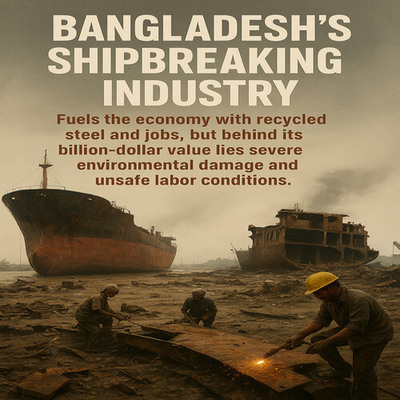The shipbreaking yards of Bangladesh – which cover sprawling fields along the coastlines – are a paradoxical industry. On the other hand, they are important economic drivers, adding significantly to the nation’s steel supply and employing thousands. On the other hand, it’s a sign of environmental destruction and terrible labor conditions and is known as “the dirty business behind a billion-dollar industry.”
Resource – wise, the breaking of ships is certainly not poor. Bangladesh is one of the world’s biggest ship recycling nations, meeting a significant part of the steel demand of the country. This recycled steel is imperative for building, construction, and industrial sectors, which would otherwise have to import costly raw materials from abroad.
The industry also supports hundreds of direct and indirect jobs, employing laborers to dismantle the enormous vessels and traders who sell the salvaged parts. This makes it an important sector, with worldwide supply and demand producing an annual turnover of several billion dollars and a major impact on the economy of Bangladesh.
But this economic might doesn’t come free and often comes at a high and hidden cost. The environmental impact is devastating. Supertankers and cargo ships, and other vessels that come to the yards, are loaded with toxic materials – asbestos, PCBs, heavy metals, and petroleum residues.
The process, mostly a manual and crude one, causes the toxic substances to go directly into the coastal environment. The intertidal areas, which are essential to the survival of ocean life and to coastal peoples, are poisoned, life destroyed, and the land and the water are unusable.
It is a recurring theme in stories and media accounts that the waste is not managed properly, hazardous waste is dumped in an uncontrolled way, and the soil, air, and water are poisoned for generations.
The working conditions are even more alarming. The industry has a reputation for lax safety standards and exploitative labor. Workers, many of them migrants from impoverished areas, labor in highly risky conditions with little protective equipment.
Day to day, there are the explosions, the fires, the falling debris, and the exposure to toxic fumes. Tragic fatal collisions and catastrophic injuries are all too often underreported and frequently not fully paid for. And workers all over the world experience long-term health conditions – lung disease, cancers, and neurological damage – as a direct result of working with these substances unprotected. Child labor, while officially banned, has also continued to simmer in some yards.
It took significant reforms longer to follow, despite international pressure and local activism. Some yards have made strides to reduce safety and environmental violations, but these are the exceptions, and the industry remains marked by a shocking disregard for human life and the natural world.
The allure of fast profits and sheer volume of operations typically takes precedence over the desire for sustainable practices and humane treatment of workers.
It’s a complicated issue, shipbreaking in Bangladesh. Its economic benefits are inarguable, but its toll on people and the planet is prohibitively high.
MD Shariful Islam Asif
Associate
Advocacy Legal BD

